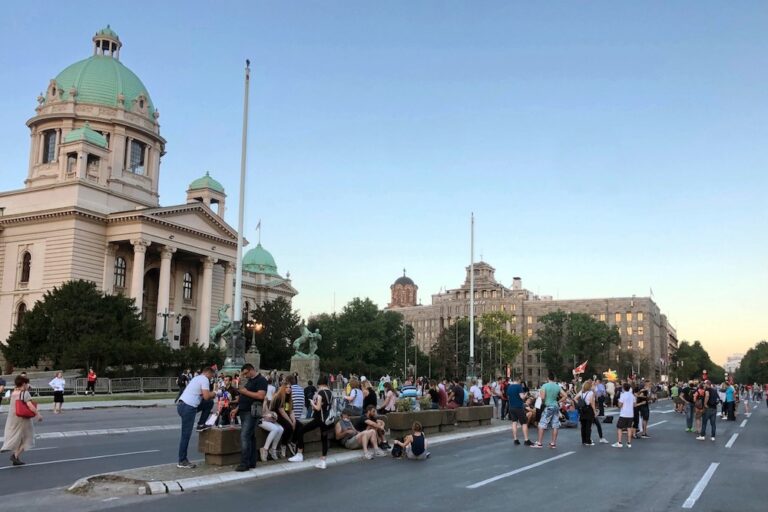(Human Rights Watch/IFEX) – Elections in Serbia, the Federal Republic of Yugoslavia, on 21 September 1997 will be neither free nor fair, declared Human Rights Watch/Helsinki on 18 September 1997. State control of the media and a lack of accountability for police brutality following last year’s elections seriously undermine the legitimacy of Sunday’s vote. “An […]
(Human Rights Watch/IFEX) – Elections in Serbia, the Federal Republic of
Yugoslavia, on 21 September 1997 will be neither free nor fair, declared
Human Rights Watch/Helsinki on 18 September 1997. State control of the media
and a lack of accountability for police brutality following last year’s
elections seriously undermine the legitimacy of Sunday’s vote. “An election
that does not allow open debate, particularly on television, and a climate
of impunity are antithetical to real democracy,” charges Holly Cartner,
Executive Director of Human Rights Watch/Helsinki. “In his unwillingness to
relinquish power, President Slobodon Milosevic and his ruling Socialist
Party have subverted the electoral process.” The Milosevic government has
demonstrated a blatant disregard for human rights during the past year,
according to a new report, “Discouraging Democracy: Elections and Human
Rights in Serbia,” released on 18 September 1997.
In November 1996, it annulled the results of local elections won largely by
the opposition in Serbia and then beat those who protested. The government
ultimately recognized the opposition’s victory after eighty-eight days of
peaceful demonstrations, but not before police arrested and beat hundreds of
demonstrators. Excessive force was used on many occasions, even against
journalists and others who were clearly not part of the protests. While the
state-run television and radio ignored the massive protests, the government
harassed and, at times, shut down the independent media that was covering
the demonstrations. Many of these violations, such as the government’s
restrictions on the independent media, continued throughout 1997. In July
the government temporarily closed down over seventy-five independentor
opposition radio and television stations, ostensibly to “establish order” in
the airwaves.
Other violations, like policeviolence against peaceful demonstrators and
journalists, have never been addressed by the government. To this day, not a
single government official or police officer has been held accountable for
the violence that took place, even though more than sixty criminal charges
have been filed with the state prosecutor by demonstrators and journalists
who were beaten. Impunity for such abuses of authority virtually ensures
that they will reoccur. Although most western governments criticized the
1996 electoral violations and subsequent police violence, many have since
taken steps to welcome Yugoslavia back into the international community. In
April 1997, the European Union granted Yugoslavia preferential trade status,
which gives Yugoslavia beneficial conditions when trading with E.U.
countries. Then, on 15 May, the European Commission approved an aid package
to Yugoslavia worth U.S. $112 million. In this way, the E.U. has rewarded
Yugoslav President Milosevic for doing what he was legally obligated to do
in the first place recognize the elections without regard for the other
human rights violations that persist today, including the persecution of
ethnic Albanians in Kosovo and Milosevic’s refusal to cooperate with the war
crimes tribunal on the former Yugoslavia. Such concessions squander an
essential source of leverage to compel Milosevic to improve his human rights
record and to comply with the Dayton Agreement. In the report, Human Rights
Watch/Helsinki makes the following recommendations, among others, to the
Milosevic government and the international community:
Human Rights Watch/Helsinki calls on the Serbian (republican) and Yugoslav
(federal) governments to:
-Prepare new media laws and regulations in full consultation with the
independent media in Yugoslavia that guarantee freedom of expression in
television and radio. Concrete changes in the Serbian Law on Radio and
Television, the Laws on Connection Systems, and the Laws on Information
should guarantee that broadcast licenses are distributed and regulated by an
independent body without regard to political considerations. The new laws
should take into account the concerns and proposals of the independent media.
-In the interim, permit all currently licensed, and all unlicensed but
currently operating, radio and television stations to broadcast without
interference. No regulation of the airwaves should take place until
Yugoslavia has a new set of media laws and regulations that guarantee free
expression in accordance with international standards.
-Ensure all parties contesting in the September 21, 1997, elections, and
future elections, equal access to state television and radio, as well as to
the state news agency, Tanjug. Human Rights Watch/Helsinki calls on the
international community to:
-Carefully monitor the September 21, 1997, elections and its follow-up,
making public the findings. Violations in electoral procedure, as well as
violations before and after the vote (such as restrictions on the media or
attempts to alter the results), should be publicly condemned.
-Implement a policy of human rights conditionality for aid to Yugoslavia.
The international community should establish welldefined human rights
benchmarks and a timetable that the Yugoslav government must abide by, with
negative consequences when progress is not made. Reviews should be regular
and transparent.
-In bilateral and multilateral meetings with Yugoslav government officials,
discuss the issues and recommendations raised in this report, and emphasize
the importance of Yugoslavia respecting its international human rights
obligations.
-Provide assistance to Yugoslavia’s civil society, especially local
nongovernmental organizations and the independent media. Human Rights
Watch/Helsinki calls on the European Union to:
-Strongly reaffirm its principle of human rights conditionality and its
readiness to respond firmly to Yugoslavia’s non-compliance.
-Consider human rights conditions in Yugoslavia when reviewing Yugoslavia’s
preferential trade status, as is required in the April 1997 agreement
between Yugoslavia and the E.U..
Lack of improvement in the key areas mentioned in the agreement (medialaws,
independence of the judiciary and minority rights) should result in
disciplinary action against Yugoslavia and, perhaps, are vocation of the
preferential trade status. Human Rights Watch/Helsinki calls on the European
Parliament to:
-Ensure that E.U. conditionality principles are implemented.
-Ask to be kept fully informed about such implementation by the European
Commission and European Council on an ongoing basis. Human Rights
Watch/Helsinki calls on the Organization for Security and Cooperation in
Europe (OSCE) to:
-Deny Yugoslavia readmission to the OSCE until there are concrete
improvements in the country’s human rights record, including respect for
freedom of the press, independence of the judiciary and minority rights, as
well as cooperation with the International Criminal Tribunal for the former
Yugoslavia.
* This release is also available in Serbian.
Copies of this report are available from the Publications Department, Human
Rights Watch, 485 Fifth Avenue, New York, NY10017-6104, United States, for
U.S. $8.50 (North American shipping) and U.S. $13.00 (international
shipping).Visa/MasterCard accepted.


